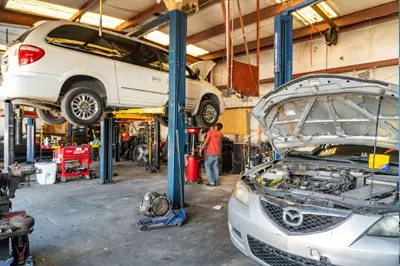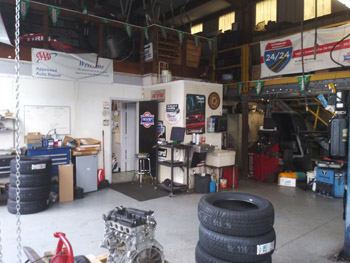All Categories
Featured
Normal engine tune-ups are essential for maintaining your car's efficiency, improving fuel efficiency, and prolonging its life-span. Whether you're a seasoned automobile proprietor or a newbie, comprehending the essential aspects of an engine tune-up can assist you keep your vehicle running smoothly for many years. Right here are some crucial ideas to direct you with the procedure.
- Adjustment the Spark Plugs. Ignition system are little however magnificent parts that play a critical duty in firing up the fuel-air blend in your engine. Over time, they can wear or come to be fouled, resulting in inadequate engine performance, decreased gas effectiveness, and tough starts.
Throughout a tune-up, check your spark plugs for wear and replace them as needed. For most automobiles, trigger plugs should be changed every 30,000 to 100,000 miles, depending upon the kind and product. Fresh trigger plugs ensure reliable combustion and smoother engine procedure.
- Evaluate and Change the Air Filter. The air filter is your engine's very first line of defense against dirt, particles, and other contaminants. A stopped up or filthy air filter can limit air movement, creating your engine to work harder and consume even more fuel.
Check your air filter during a tune-up and replace it if it's filthy or past its advisable solution interval. A tidy air filter boosts engine efficiency and improves gas economy.
- Check the Gas System. With time, your gas system can gather dust and carbon down payments, minimizing engine performance and fuel efficiency. Cleansing the fuel injectors and fuel lines during a tune-up aids keep correct gas shipment and combustion.
You can use a fuel system cleaner or have a professional mechanic perform a more detailed cleaning. This action is particularly helpful for older lorries or cars and trucks regularly driven in stop-and-go traffic.
- Examine the Belts and Pipes. Belts and hoses are critical for numerous engine features, such as running the alternator, water pump, and a/c. Throughout a tune-up, check for fractures, fraying, or indicators of wear on these elements.
Change any worn-out belts and tubes to stop potential malfunctions. A broken belt or dripping pipe can cause engine overheating or loss of power, so resolving these concerns quickly is important.
- Replace the Engine Oil and Oil Filter. Engine oil is essential for lubing moving parts, reducing rubbing, and regulating engine temperature. Gradually, oil becomes contaminated and loses its efficiency.
As part of a tune-up, change the engine oil and oil filter. Utilize the type of oil suggested by your automobile's maker and stick to the suggested change intervals. Clean oil maintains your engine running efficiently and stops premature wear.
- Test the Battery and Billing System. A healthy and balanced battery is important for starting your cars and truck and powering its electric systems. Throughout a tune-up, check the battery's voltage and check the terminals for rust. Clean the terminals if needed and make certain a safe connection.
Furthermore, test the generator and billing system to guarantee your battery continues to be charged throughout operation. If your battery is weak or old, take into consideration changing it to avoid unforeseen break downs.
- Flush and Fill Up the Coolant. The air conditioning system manages your engine's temperature, stopping it from overheating. Old or infected coolant can shed its performance, bring about possible engine damage.
During a tune-up, purge the old coolant and change it with a fresh combination. Also, inspect the radiator, thermostat, and hoses for leaks or damage. Keeping the cooling system in good problem guarantees your engine runs at the appropriate temperature.

- Address Caution Lights and Uncommon Symptoms. Modern lorries are geared up with analysis systems that inform you to prospective concerns through dashboard caution lights. If your check engine light or any kind of various other advising signs get on, address them during your tune-up.
In addition, take notice of uncommon symptoms such as unusual noises, rough idling, or decreased gas performance. A professional auto mechanic can detect and solve these problems throughout the tune-up procedure.
- Do Not Forget the Exhaust System. Your car's exhaust system removes hazardous gases from the engine and ensures proper discharges. Check the exhaust system for leaks, rust, or damages during a tune-up. A malfunctioning exhaust system can influence engine performance and lead to environmental and safety concerns.
- Usage High-Quality Parts and Fluids. When replacing parts or rounding off liquids throughout a tune-up, always go with high-grade items that satisfy your car's specifications. Utilizing poor parts or inaccurate liquids can adversely affect your engine's performance and long life.
Final Thought: Routine Tune-Ups Are Secret to Engine Health And Wellness. Putting in the time to tune up your engine guarantees it runs successfully, conserves gas, and reduces the risk of failures. Whether you perform these tasks yourself or rely on a trusted mechanic, regular tune-ups are a financial investment in your automobile's integrity and long life. Adhere to these tips, and you'll appreciate a smoother, extra trustworthy ride for several years ahead.
Latest Posts
Improve Your Home with Overhead Door Solution
Understanding Roof Covering Guarantees: What Homeowners Ought To Know
How Consistent Auto Maintenance at Montclare Auto Repair Saves You Money
More
Latest Posts
Improve Your Home with Overhead Door Solution
Understanding Roof Covering Guarantees: What Homeowners Ought To Know
How Consistent Auto Maintenance at Montclare Auto Repair Saves You Money
